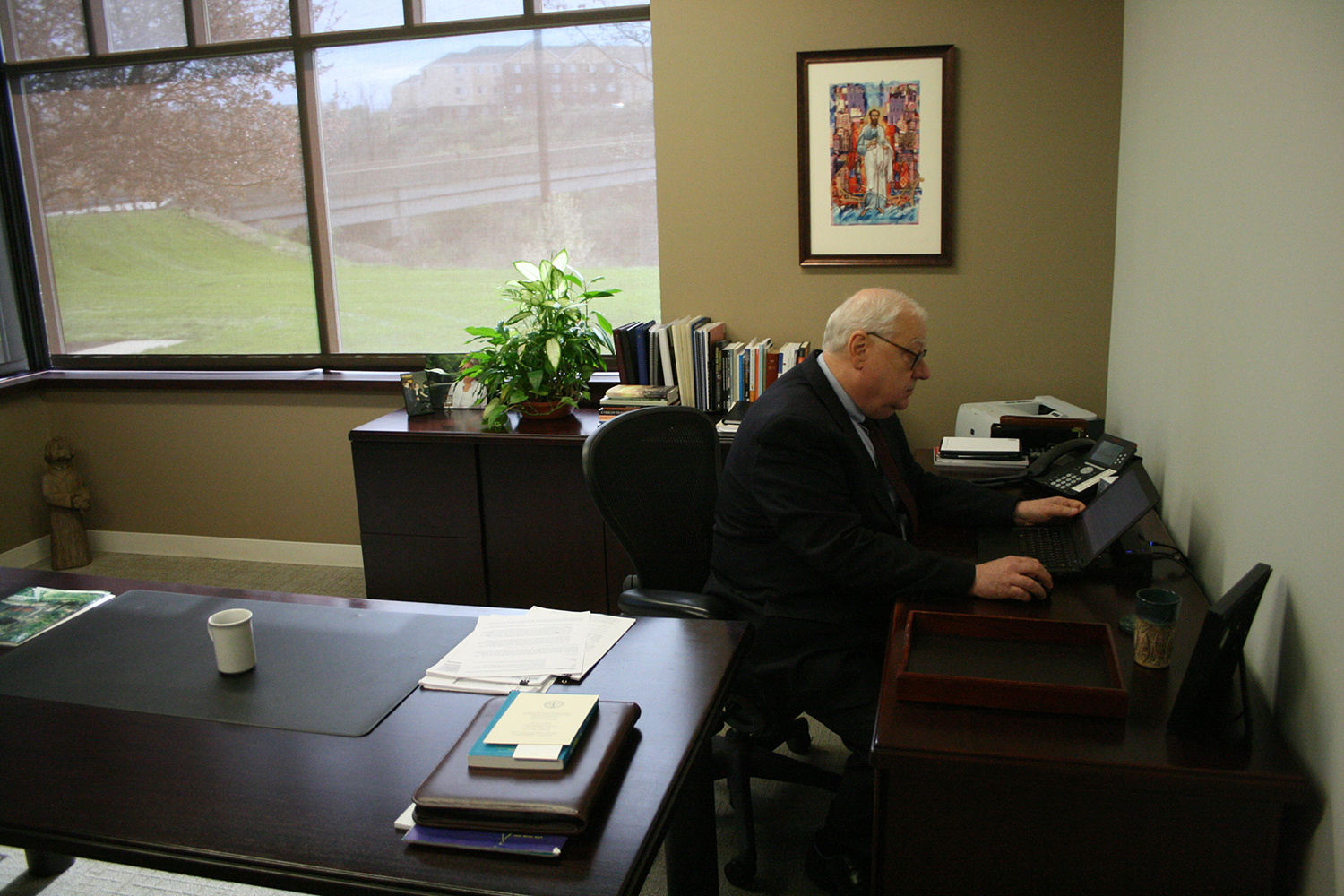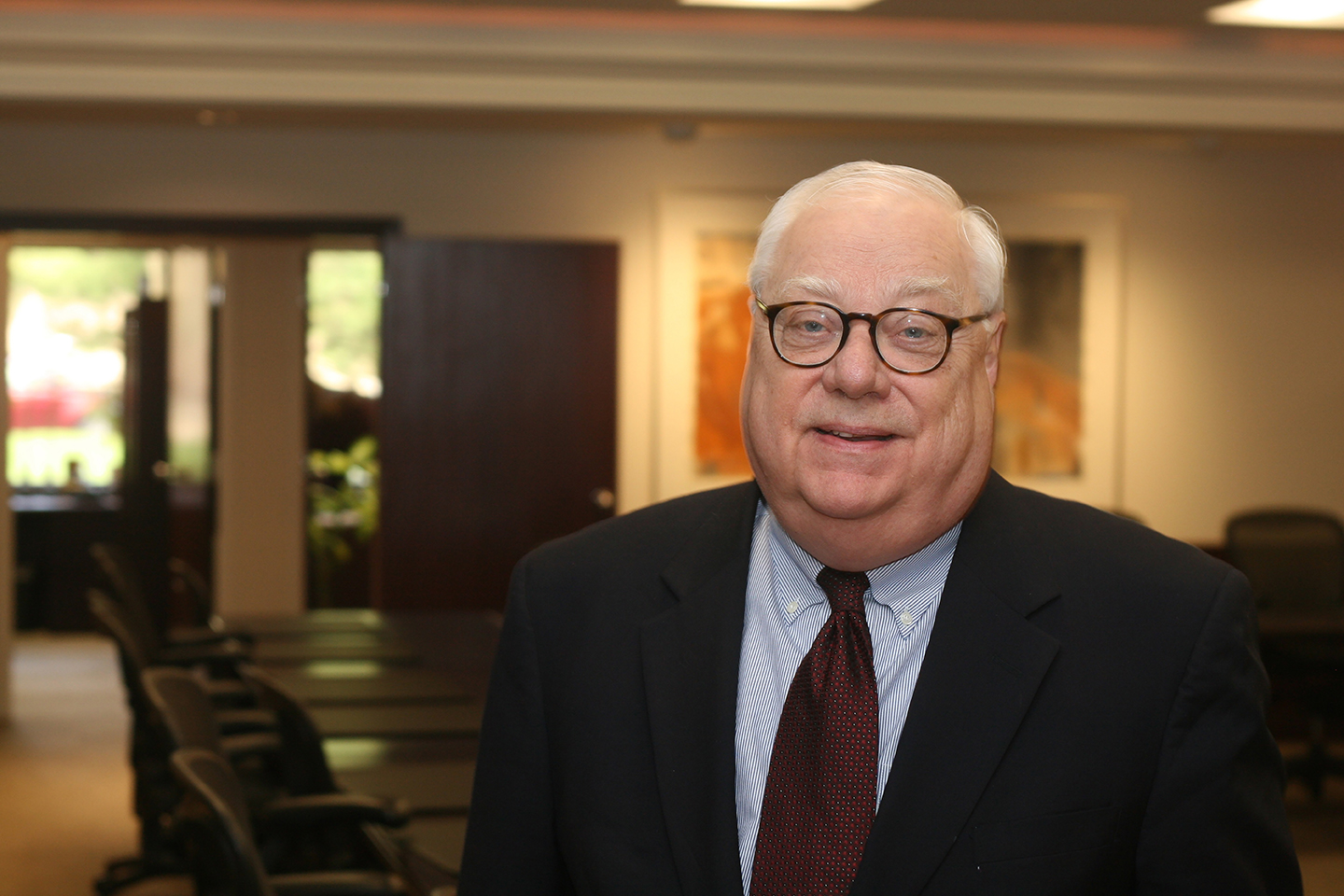When Daniel Aleshire, whose organization accredits most U.S. seminaries, retires next year, he’ll have witnessed a quarter century of what may have been the most dramatic changes in clergy education in the country’s history.
Informed ministry is superior to ignorant ministry, says Daniel Aleshire, and he should know. Retiring next year as head of the premier U.S. accrediting agency for seminaries, he’s seen a sea change in the way clergy are educated.
“I think that I’m the advocate for the education of religious leaders,” says Aleshire, who joined the staff of the Association of Theological Schools in 1990 and became executive director in 1997. In an interview at the agency’s office in Pittsburgh, Pa., Aleshire summed up his role that will end when he retires no later than June of next year.
Aleshire’s ministry began as a professor of psychology and Christian education at Southern Baptist Theological Seminary and as pastor and associate pastor of churches in New Jersey and Kentucky. That included five years as associate pastor of the then seminary flagship Crescent Hill Baptist Church in Louisville, Ky., between 1981 and 1985.
His career track took a turn in 1990 when he became associate director for accreditation for ATS, then associate executive director in 1996 and executive director in 1997.
In the fifth or sixth grade in Columbus, Ohio, where he grew up, Aleshire said his parents replaced his children’s Bible with a new “reference Bible that has fallen out of favor now” with his dad’s inscription from 2 Timothy 2:15: “Study to show thyself approved unto God, a workman that needeth not to be ashamed, rightly dividing the word of truth.”
“I’m still committed to that verse. I think that informed ministry is usually superior to ignorant ministry.”
More than 270 graduate schools of theology in the United States and Canada enrolling 74,500 students and employing more than 7,200 faculty and administrators form the Association of Theological Schools. The ATS has two broad areas of work: programs, services, research and other resources to support the work of administrators and faculty at member schools and a Commission on Accrediting that approves degree programs offered by member schools.
“Theological schools are hybrid institutions,” Aleshire says. “They have one foot in higher education. They have the other foot in church. They change either as higher education or the church changes, and right now both of those realities are changing.”
Aleshire says theology schools serve the church in a variety of ways.
“They are kind of environments that advance the church’s intellectual agenda and how we take historical theological realities and reframe them in the intellectual idiom of the day. That’s something theological schools do. I think theological schools also seem to be kind of a witness on behalf of the church to a broader higher education community. You see that particularly in university related divinity schools speaking on behalf of the theological disciplines to a broader university context.
“But I think the way I would say they most serve the church is by educating leaders and by advancing the intellectual ways by which commitments of faith are framed and understood.”
The Christian movement “has had a significant intellectual tradition,” running from the biblical book of Romans to today.
“Theological schools don’t have the exclusive franchise to that. A lot of good thinking goes on in congregations, but they do have a particular responsibility to carry that long tradition forward in research and writing.”
“We have a number of changes going on in theological education, and the dust hasn’t settled on which of those changes are going to be the most helpful or the most appropriate.”
Educational changes are always controversial, Aleshire says. When his father-in-law attended Southern Seminary in the late 1930s, the primary method of teaching was “recitation,” where the typical class would be a professor asking students questions about their reading and then adding an “editorial commentary” about the written text.
“Everyone knew what that course was about because of that written text. Then there was a subtle controversy at Southern, because a bunch of new whippersnapper professors like Dale Moody and Wayne Oates and a number of others in the ’40s began lecturing. Lecture was controversial because actually what was going on was the professor was creating an oral text. It wasn’t based on just here’s a written text, and students recite and faculty would comment on it. The lecture was a whole editorial construction, and it was controversial.
“I’ve never known of an educational innovation that hasn’t been greeted by some as a great danger or a great loss,” he says. “It’s true generally in higher education. It’s more true in theological schools, because part of their job is to conserve. They’ve got 2,000 years of Christian history in the backpack they’re trying to carry along. So they are conserving institutions.”
Theological education is “in a complex moment right now.”
“We have a number of changes going on in theological education, and the dust hasn’t settled on which of those changes are going to be the most helpful or the most appropriate.”
Forty years ago the controversy was whether theological education 9 9offered in extension centers could have similar quality as a degree completed in residence on a central campus. “We’re pretty well convinced at this point that you can get a good theological education in an extension center if that center is well run,” Aleshire says.
Today theology schools are raising the same questions about online education.
“ATS has been very, very cautious about online theological education and has been far later to the game than most of the rest of higher education in general,” he explains. “You were able to earn a nursing degree online or a counseling psychology degree online a long time before the ATS Commission on Accrediting began making more online education possible.”
Aleshire’s father-in-law went to Southern Seminary to study for what was then called the bachelor of divinity degree, at a time when most students were single, lived in a dorm, ate together, attended classes during the week and went out to their churches on the weekend.
But by the 1980s, the student body at Southern was more diverse.
“Not as many were single, so they were living in either seminary-provided married student housing or they were living at a church and commuting in,” Aleshire says. “They weren’t eating together anywhere any more. It was hard to get a food service that the seminary could keep going.
“What happened is over time, even though the classes were on the primary campus of a school, the student body increasingly has become in Protestant seminaries a commuter student body.”
Aleshire says today about 25 percent of students at ATS schools live on or near the campus, while about half live at some distance.
“It’s not that community that lived together, worked together, ate together and hasn’t been that for years. Residential doesn’t mean what residential used to mean. That definition changed by practice, even though it still looked like students were in the class face to face.”
Meanwhile, a couple of things have happened with online education.
“One is that we have learned a whole lot about how to do it,” Aleshire says. “The second is the technology now exists and the bandwidth now exists to do some relatively interesting things with it. If you were still dialing up on a telephone with a modem, we wouldn’t have much distance education.”
“What’s happened is that the infrastructure has shifted in the last 20 years and developed. I don’t think there’s a single library left in the ATS that has a card catalogue. Every holding of the library, at least the bibliographic reference of it, is accessible online. So you can search the whole library catalogue at your computer, and most seminaries are set up so you can order books and they will be mailed to you. The difference is you’re not physically looking at the card catalogue and carrying books out of the library, but you’re looking at probably a more cross referenced indexing of those sources.”
Within the last year, Aleshire said the publishing house McGraw-Hill reported that the company’s online publishing is now a larger market than print.
Almost all ATS schools now subscribe to online journals, so students can read articles online. Google has scanned everything in Andover-Harvard Theological Library, one of the most complete theological libraries.
“They can’t make it all available yet, because it’s tied up on copyright issues,” Aleshire says. “But in general where we are now from 20 years ago, there’s a lot more substantive literature available online. There’s more information available online. So the combination of the availability of reference information and the technological capacity makes doing certain things online possible.”
Every online program the ATS has approved includes significant interpersonal interaction, but what it does is “move a significant part of the community of formation to congregations.” Many online programs require students to be employed in congregations.
“They may be learning Romans online, but there will be assignments in that online course about how they either preach or teach from Romans, whatever their context or setting.”
“Probably you can learn content as well online as you can in a classroom,” he says. “There’s some evidence that you may learn biblical languages better.”
Another change is social media platforms that allow students extensive interpersonal relationships either in terms of an entire class or individuals with one another or a professor. “We know that students can become deeply connected to each other if they communicate online with each other over time, particularly if supplemented by an occasional trip to campus for an intensive course where they meet one another.
“You now have a lot of things that didn’t exist that are not exactly replicating what on-campus was but are providing patterns of potential engagement both with content and with other individuals,” he says. “And if the course is well-designed, it also engages students with a ministry setting with which they’re working.”
“We’ve been very cautious about online. We’ve only within the last two years approved an M.Div. to be earned online. What we’re learning is if that kind of program is done with quality it looks like the kind of learning is comparable and at times may be superior to on-campus learning because it’s learning in context, it’s not isolating the theological learning from the practices of ministry.”
Another hot topic is whether the master of divinity degree, the gold standard for theological education since ATS began accrediting schools in the 1930s, is still relevant.
That’s not as simple a question as it seems. No one in Catholic seminaries is thinking about giving up on the M.Div., Aleshire says, but some are developing additional programs for lay leaders needed as the numbers of candidates for the priesthood declines and the number of Catholics grow. Increasingly, priests are taking on responsibility for more than one parish.
Mainline Protestant denominations that require seminary for ordination have traditionally served as “keepers” of the M.Div., while in Free Church traditions like Baptists the degree has always been recommended but not required. “The reason for getting an M.Div. was to do better the work you were called to or with more knowledge,” Aleshire says. “It wasn’t a thing you had to have in order to do the work.”
“For a big hunk of the ATS world, the M.Div. was never the required degree. When I went to Southern, there was a matriculation fee but virtually no real cost. The cost of going to seminary was the living cost and the books. There was so little tuition, because the [Southern Baptist Convention] basically paid the bill. What’s happened in the last 40 years in American Protestant theological education is that every denomination has backed off from how much of the bill it pays.”
“If you look at the amount of money that denominations are putting into Protestant theological education, the dollar amount has increased slightly over the last 20 years but as a percentage of expenditures that amount has declined,” he adds. That means students are paying more through tuition. “When students start paying more for tuition, they start asking consumer questions about theological education. Do I really have to have 90 hours of this stuff? Is there a way to compress this program?
“There’s the ideological critique of M.Div., and then there’s the practical critique of the M.Div. The practical critique is it’s just too long, the students are bearing too much of the cost. The result is they end up going into ministry with more debt than is healthy for them or they fail to go into the ministry because they’ve got so much debt they need to go into something that provides more income.”
“The ideological critique of the M.Div. is that it’s been too theoretical,” he continues. “You learn abstract ideas. You become acquainted with the intellectual tradition of the church, but that doesn’t do anything to help face the realities in practicing congregations in an increasingly secularized environment. It’s a critique that the M.Div. as it’s constructed has you doing too much of the wrong stuff and not enough of the right stuff.”
He notes that ATS schools are in the middle of responding to both critiques.
 While imperfect, the basic structure of theological education “is a relatively efficient way to communicate as much as possible to as many as possible,” Aleshire believes.
While imperfect, the basic structure of theological education “is a relatively efficient way to communicate as much as possible to as many as possible,” Aleshire believes.
“It’s very clear that some people become deeply tutored just by studying on their own. Some people learn to play the piano without much of a piano teacher. Some people become great at business and never went to business school. So a school is not necessarily the only way, and it’s not always a guarantee, but it’s a way in which the most information in an ordered way can get to the largest group of learners.”
“I think this tradition is intellectually elegant and it deserves our intellectual care and stewardship,” he says. “I don’t think you have to be a genius to love Jesus or to lead people of faith, but I do think you need to understand that you are part of a tradition that through much of its millennia has thought deeply about how we understand what God was doing through Christ and what God is calling us to do in a particular culture and a particular day. I don’t think you just study Romans. If you study Romans, you are in part formed by the complexity of how it understands our relationship to God, to sin, to growth in faith over time, and this is tradition founded by a teacher who spent most of his ministry teaching and did not teach practical details a whole lot.
“There were some practical instructions to the disciples, but for the most part he was speaking analogically and a lot of his stuff, the parables, the disciples’ response was, ‘What did you mean?’ Now we kind of have a suspicion about patterns of communication that don’t explicitly lead to the immediate application and conclusion. I think what Jesus was saying is more complex than do one, two and three, though it involves one, two and three.”
Compared to other disciplines, Aleshire thinks the closest cousin to theological education is business.
“If the corporation is really messed up, somebody will say, ‘What were the business schools doing right or wrong? We don’t have a tendency to blame medical schools for the illness of the 9 9American population. We don’t have a tendency to blame law schools for the criminal presence in the prison. We do tend to blame business schools or theological schools if something is wrong in the church or if something is wrong with how the economy is functioning.”
He adds: “I’m not only committed to theological education. I’m committed to the kind of institutions that provide it.”
The “growing Protestant critique” isn’t the only story in theological education.
“If you look at who the new members of ATS are over the last 20 years, we now have 11 seminaries in ATS that are primarily serving Asians,” says Aleshire. “So here’s a group of Korean or Chinese immigrants who have come and now either brought a Presbyterian Korean denomination or have created their own denomination as a community, and after they get a hundred or two hundred congregations, they say, we need a seminary, and they found a seminary.
“In the last 10 years, we’ve received about 30 or 35 new member schools in ATS,” he notes. “A part of the critique of theological education is where religion is groaning, and a part of the affirmation of theological education is where religion is growing.”
“Seminaries are founded as religious movements are on the upswing. They’re never founded as the last gasp of a dying community of faith. So we have all these new [Cooperative Baptist Fellowship] seminaries that were really created as a community of Baptists were trying to understand themselves virtually as a new movement coming out of the SBC and to really construct Baptist life and learning differently than it had been constructed in the SBC.”
A few years ago the African Methodist Episcopal Church began requiring an M.Div. for full ordination. “So we have the interesting moment where much of the critique of the M.Div. is within the white community that’s finding itself in an increasingly distressed environment. And much of the embrace [of the degree] is in racial ethnic communities — either new immigrant communities or others that are trying to advance the educational level of their pastoral leaders.”
Aleshire talks to a lot of reporters, and he tells them there are at least five stories going on.
“There’s a Roman Catholic story that takes education for priesthood and increasingly education of lay leaders very seriously and commits resources toward that. There is the movement of communities of color that now comprise almost 40 percent of the enrollment of ATS schools. There’s a mainline story. There’s an evangelical Protestant story, and they follow different tracks under the theme of theological education and they are changing in different ways.”
“Those different stories are the deep story,” he says. “This is not one thing and this is not as homogenous as it appears to be from the outside.”
Aleshire hasn’t thought much about what he plans to do when he retires, partly because an expert years ago commented that in his experience seminary presidents spend more time working on their “golden parachute” than business CEOs do.
“He meant by that not that they’re working on what their financial package is going to be, but they spend so much time thinking about what they’re going to do when they get out of these jobs that they don’t bring their full intellectual energy to the jobs they need to do,” Aleshire says.
“I’ve just been doing my job and engaged in that and want to be faithful to the privilege I’ve had. I figure I’ve made other major adjustments in my life, and I’ll come up with something. As I’ve watched people retire, what is interesting is a lot of times what they end up doing is not what they imagined but it was because a particular opportunity emerged and it fit their skill set and their calling. It may be that what I’ll be doing two years from now is something that I would never imagine now but is an opportunity.
“That’s bleak answer according to retirement planning,” he concedes. “You’re supposed to have all this stuff ready. But I don’t know. So much is going to change in my life when I retire, because this has been a consuming job for almost three decades. It’ll emerge.”
This article was first published in the Summer 2016 issue of Herald, BNG’s magazine sent five times a year to donors to the Annual Fund. Bulk copies are also mailed to BNG’s Church Champion congregations.



